All the Answers
Well-known member
The Government confirmed that it will end the SUBE monopoly: doubts and benefits of the system - Infobae

Source:
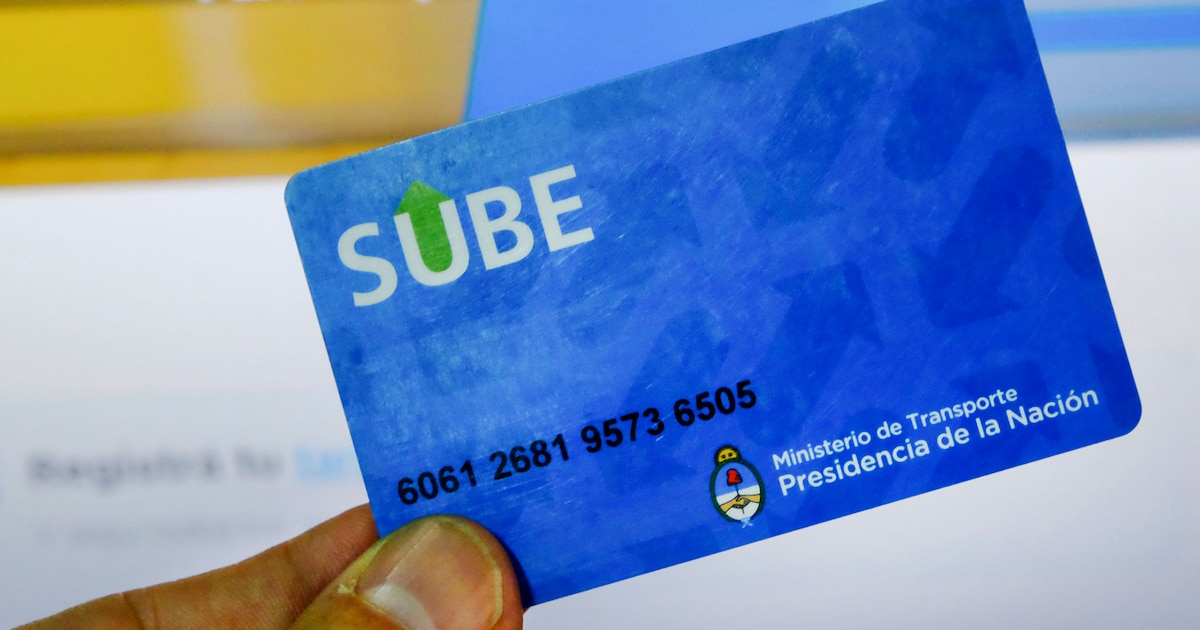
El Gobierno confirmó que terminará con el monopolio de la SUBE: dudas y beneficios del sistema
La iniciativa oficial de abrir la red y universalizar los medios de pago abrió un debate en torno de los pros y contras del viejo sistema y de las formas de modernizarlo
April 08, 2024
The official initiative to open the network and universalize payment methods opened a debate about the pros and cons of the old system and ways to modernize it
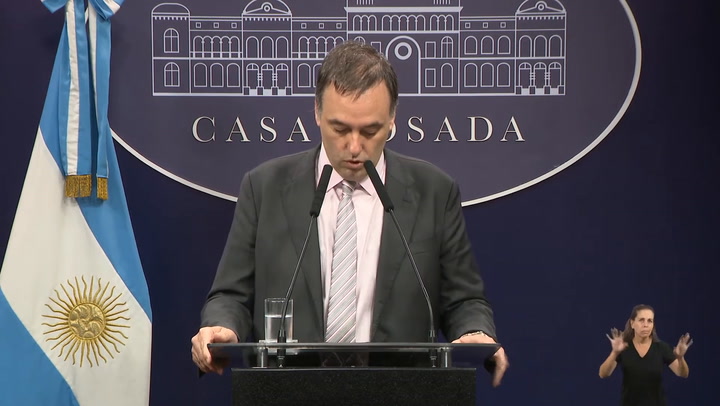
El Gobierno ConfirmoÌ Que PermitiraÌ Competir Con La Tarjeta Sube
El vocero presidencial, Manuel Adorni, explicó la iniciativa oficial
cdn.jwplayer.com
The presidential spokesperson, Manuel Adorni, explained the official initiative
The advance that Infobae gave exclusively yesterday about the decree that the Government is preparing to universalize the means of payment for the use of public transport and put the SUBE card in competition, allowing payment with any card or means of payment had a good media and network reception.
And it also generated a debate around the issue, especially with respect to the commissions that the new system will pay, how transport companies will charge, how the private data of passengers will be handled – today unified in a single database. – and also about who should make the new investments to update the system.
Today, the presidential spokesperson, Manuel Adorni , said: “The Government made the decision to release the payment system for public transportation as happens in other cities in the world where you can pay with a card, cell phone or whatever means you consider most convenient. ”.
“SUBE is not going to cease to exist, it is going to be one more option, not the only one” (Adorni)
“SUBE is not going to cease to exist, it is going to be one more option, not the only one. For us, it continues to play a key role in supervising the services provided by bus service companies and the costs they perform," Adorni announced.
“This means not only simplifying a service that was created fifteen years ago and still depended on charging at a kiosk or a payment station but also the total federalization of the system. When there is more news and details about this point that is so relevant for a good part of Argentines, we will be communicating it to you,” he concluded.
Although it works, SUBE's operation has been going on for more than a decade and has not had a major technological update, something that is evident in the difficulties in extending negative balances or the maximum amount of money to be loaded per card, in addition to the double step to validate the load that becomes virtual. In addition, it has a staff structure that seems to have grown a lot and unnecessarily, with little provision of technological development and few customer service services.
“This means not only simplifying a service that was created fifteen years ago and still depended on charging at a kiosk or a payment station but also the total federalization of the system” (Adorni)
“How would the control of operations for the payment of the subsidy be carried out with such a dispersion of means of payment? Mobile phones would be an option to provide greater and better payment access, an alternative that never wanted to be developed by Nación Servicios, the official body in charge of the network. On the other hand, it could end in a transfer of resources to private operators without investment and with management of sensitive and profitable information: the movement of users, frequency, origin and destination, reasons for trips,” asked a source familiar with the matter. topic that requested off the record .
The decree prepared by the Government will propose an open system with devices that will be located in buses and stations that must accept all cards , bank or fintech, debit, credit or prepaid, without any distinction. There will be no brands or banks with exclusivity, even temporary.
As there are multiple transport companies (in AMBA alone, the SUBE network has more than 340 bus lines), it is expected that there will be more than one company that offers the services of providing card readers and subsequent processing of payments.
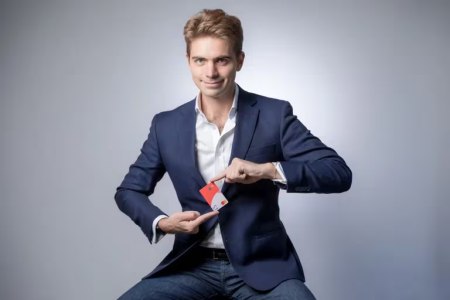
Pierpaolo Barbieri, CEO of Uala
Javier Bolzico , president of Adeba, said that the banking system has the development, human resources and technology to facilitate payment for public transportation with contactless cards and NFC [for Near Field Communication wireless technology ].
“The entities will compete to see who offers the best service and most benefits to public transport users, so that they can choose it. It would be a very important change compared to the current situation where users cannot choose, they do not have a simple system to load the card, and they cannot acquire it easily either. These types of alternatives for public transportation are already a reality and are spreading rapidly throughout the region in cities in Brazil, Colombia, Guatemala and Mexico where you can pay with contactless and NFC technology,” Bolzico reaffirmed.
Pierpaolo Barbieri , CEO and founder of Ualá, celebrated the initiative. “More options for the consumer. Less monopoly. Better. “Competition elevates us,” he said in X, commenting on the Infobae note . “I still remember the first meeting we had at SUBE, in 2016. We had not launched Ualá. I suggested emulating the London system, Oyster, and that everyone could pay with any card,” said Barbieri. The response he received, he noted, was “forget it, baby, never here.”
Meanwhile, the executive director of the Argentine Fintech Chamber, Mariano Biocca , said that the sector seeks to promote openness, competition and the implementation of interoperable systems.
“The SUBE card was always a topic that was raised for discussion, but there was never talk of replacing it completely. It must continue to function with all the benefits it brings in terms of social rates and even for those who choose it as a genuine means of payment,” he told Infobae . In addition, he assured that it has not yet been established how the payment to transport companies will be, but that the idea is that it be “equal or better” than the current one.
“More options for the consumer. Less monopoly. Better. “Competition elevates us” (Barbieri)
Regarding commissions, he highlighted: “Today the SUBE takes 7% and a debit card transaction pays 0.8%. For the media it should be much more convenient because they will be paying a much lower fee for using the payment infrastructure.” And regarding the investment for the system to work, he had no doubts: “It has to come from the private sector, but the incentives for that to happen must also be clear. Implementation on a fixed network with fiber optics throughout the entire section, such as the Buenos Aires subway, for example, is very different from doing it on bus lines in the AMBA. Even though the investment comes from the private sector, there should be millimeter synchronization and joint work between public transport operators, governments, and regulators. Then, if it is QR, NFC or other technology, it should be transparent to the user, who will use what he considers best and most practical,” he concluded.
Damián Arabia , a national deputy close to the Minister of Security, Patricia Bullrich , also celebrated the initiative. “To quickly understand: SUBE is a monopolistic state company (Nación Servicios), with 1,050 employees, that charges a 7% commission on each train, bus or subway ticket, when a credit card charges a maximum of 1.8%. or debit 0.8%. In addition to saving us that very expensive commission, SUBE plastic is not available anywhere, in many cases it is difficult to find where to load it or where to credit the load, and if you forget it or lose it you have no way to travel," he explained yesterday. in the X network.
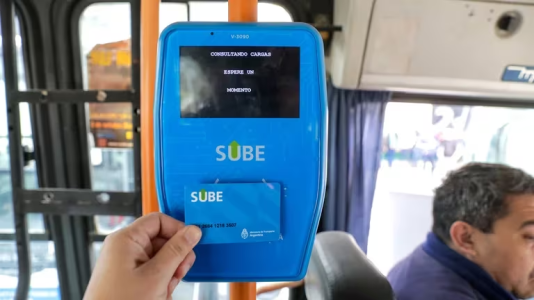
SUBE has been operating for more than a decade and has not had a major technological update (Ministry of Transportation)
“Tourists, foreign or national, cannot use public transportation because they do not have SUBE. Finally, like in the supermarket, there could be discounts. Opening up competition and being able to pay with any card or cell phone makes costs easier and cheaper for each of us. Let's open SUBE," added Arabia, who presented a bill on the subject in March, to achieve "full scope" in all means of transportation and for all cards and payment systems, NFC and others that could be created."
The project also specifies that the terminals “must be financed by payment methods, who may also offer special promotions.”
Objections
However, objections to the initiative still being developed arose from opposition sectors. On the one hand, they recognized that the SUBE operation has a notable technological delay, “which is evident in the difficulties in extending negative balances or the maximum amount of money to be loaded by card, in addition to the double step to validate the load that is makes virtual.” On the other hand, they also conceded that the 7% commission “is above what financial operators charge” although also – they added – “many times below other similar card operators in different parts of the country.”Another objection was that the administration of the system, in charge of Nación Servicios, a Banco Nación company, “grew to an unnecessary scale, with little provision of technological development and few customer service services” and that the system's communication has been poor.
Despite everything, they insisted in defense of the card introduced by Kirchnerism in 2009, “the SUBE is a comprehensive system, not just a means of payment. It contains personal data, social rate, financial information”, with which the dispersion of payment methods could violate the privacy of millions of users. “The migration of SUBE data to multiple platforms entails a breach of legal privacy and a complexity (social rate, SUBE network, and other discounts) of information transfer and costs,” they noted.
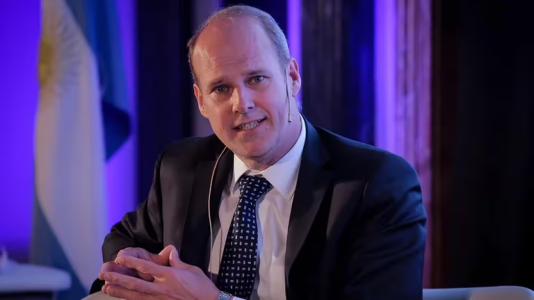
Javier Bolzico, de Adeba
Another objection was that credit cards pay after 18 days, while the payment goes up after 24 hours. Would companies accept this collection system? was one of the doubts raised. But those familiar with the system and the official initiative responded that "obviously" there will be an adaptation of the Central Bank's rules and that banks and card issuers will pay the costs and make the necessary investments to be part of a business that moves billions. of pesos per day.
“The investment will not be made by the State or the transportation companies,” said an expert on the subject, noting that, according to the objectors of the initiative, the cost of acquiring new equipment would be around 1,500 to 2,000 dollars per unit.
Another question that arose is how, with so much dispersion of means of payment, the control of operations for the payment of subsidies on the ticket or the application of the social rate would be carried out. However, the official project foresees that the SUBE will continue to operate in parallel with the new payment methods. As long as these incorporate the possibility of applying the benefits, the SUBE could contemplate them as is the case today.
Investments
An analysis document from the Argentine capital banks based in Adeba, interested in the development of alternatives, says regarding the investments that will have to be made and who will make them, that the task of the public sector –Nation, Province of Buenos Aires, BCRA, and other organizations – will be to generate a regulatory framework for the universalization of payment methods for public transportation and investments in infrastructure and communications, to achieve greater reach of the Internet. For example, through a better fiber optic network, something that will result in a better communication scheme in general, not limited to public transportation. In fact, according to the banks' analysis, "possibly due to the availability of fiber optics throughout its entire length, the subway is the means of transportation that could be closest to the implementation of an open system of these characteristics."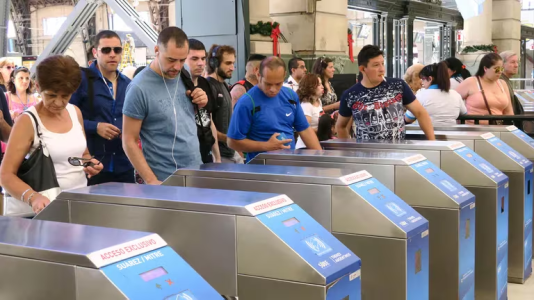
According to the BCRA, public transport users made almost 400 million trips in March 2023 using the SUBE (EFE)
The private sector, in turn, will be in charge of installing the reading systems for the different payment methods and the payment method providers (Banks, PSP, processors) will be responsible for providing the payment systems that support the operation. The central point, the banks said in the document released in June 2023, “is to add alternatives instead of limiting possibilities.”
The current system, say banks and payment method providers, became obsolete "because it is a closed system, in which you can only pay for the ticket if you first obtained a SUBE card, which leaves out the rest and goes against of the interoperability of payment methods. In addition, they continue, it requires prior funding (loading the card) which complicates the user, because if they do not have the SUBE at the time of boarding the means of transport, due to forgetfulness, loss, insufficient balance or any other cause, they are excluded. To make matters worse, they say, “the recurring lack of plastics constitutes an additional difficulty.”
The modernization and universalization of payment methods, they conclude, will directly benefit millions of Argentines who regularly use the SUBE network, will improve the experience of users (time savings, greater ease of payment, competition between companies to retain use) and It will even allow tourists and citizens from jurisdictions where there is no network to use public transportation without complications.
Just for reference, Adeba's document stated, "in Argentina there are more than 91 million cards issued between bank debit and credit cards, in addition to prepaid cards issued by fintechs," which gives an idea of the capillarity and scope of universalization and the benefits they would have for public transport users. “Tourists, foreign or national, cannot use public transportation because they do not have SUBE,” they point to a blind spot in the current system.
What the transporters say
In the transport sector, the reaction was more cautious. “Anything that is innovation and improvements, welcome. But it doesn't have to be just a business for the banks. The SUBE is 12 years old and works well, but has problems with the plastics and a very large structure. We have some doubts. The card is not only a means of payment, it also allows transactions to be geolocated. How will it be done with other payment methods? Same for subsidies. It is also not clear how the databases will work, as they will no longer be unified,” they said from one of the business chambers of the bus transportation sector, in partial coincidence with those who objected, in principle, to the official initiative.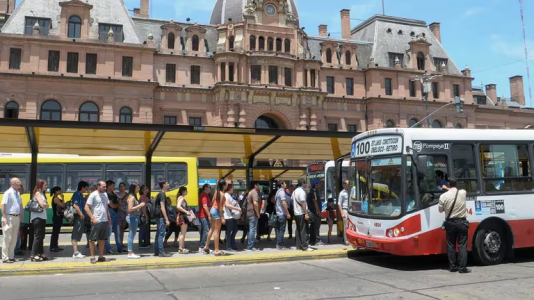
“The recurrent lack of plastics constitutes an additional difficulty,” said Adeba (NA)
“Today the collection, for example, is paid the next day. Companies have many problems and if the banks pay us in 20 days, it is of no use to us. It is not clear. What commissions are they going to charge us? All this will have to be specified very well. We operators are outside the negotiation table for the moment,” commented a transport businessman, who raised another question: “ Contactless payments like in Spain, for example, are they going to be able to be made in places with very little signal as is the case?” in some places in the Conurbano? There are financial and operational issues that we must clarify. This has to serve us all.”
In the payment methods sector, however, they were more assertive about the need and benefits of the universalization of payment methods. “The sector has been talking about the issue for a long time. The SUBE system may continue to exist, as in Australia, Brazil and England. We want it to be an open and digitalized system. Regarding the payment time, for the moment they would be the same, we do not believe there will be changes, you could pay the same as now, without problems. This will contribute a lot to the digitalization of all commerce. If you pay for transportation with NFC, you will pay for the soda at the kiosk in the same way. A positive habit is generated,” highlighted an executive from one of the large companies in the sector.
However, some issues arise from his response that could generate disagreements with carriers when it comes to implementing a new, open and universal system. Regarding who should pay for the technological update, the executive said that it should be “joint” between private parties, for example between transportation companies, means of payment – such as credit and debit cards – manufacturers of those card readers, acquirers –such as Prisma and Fiserv–, and others. “How much each one will pay and who we will be in the end, we will see. However, they are not usually unattainable amounts. “It is relatively easy,” he assured.
For his part, Damián Di Pace, director of Focus Market, celebrated the idea of opening the system. “It is the starting point to give the user more alternatives, reduce bureaucracy and SUBE recharge times by using the account itself in another means of payment, disintermediate and choose for competition in the market and benefit on which means of payment is more convenient for each means of transportation, among others,” he expressed.“A system in competition by credit cards, debit cards, digital wallets and other market players will result in benefits for the user” (Di Pace)
“A competing system by credit cards, debit cards, digital wallets and other market players will result in many benefits. Competition will reduce costs for the government, debureaucratize the system and benefit the consumer,” concluded the director of Focus Market.
Decree in progress
The truth is that the initiative, which is being discussed in several Government offices at the same time, has been taken: the Government will issue a decree to remove the exclusivity of Nación Servicios and the SUBE system in the administration of the payment of public transport tickets. the whole country. It will be the first step so that all users can pay for the bus, subway or train with any debit or credit card. The Ministry of Commerce, the Ministry of Transportation and the Central Bank intervene in the project, with different powers and in conversation with the companies involved to reach a final text for the signature of Luis Caputo and President Javier Milei .The decree in progress will repeal another, 84/2009, which implemented the Single Electronic Ticket System and placed it in the hands of Banco Nación. It will also leave behind the “framework agreement” that regulated this monopolistic management by Nación Servicios.
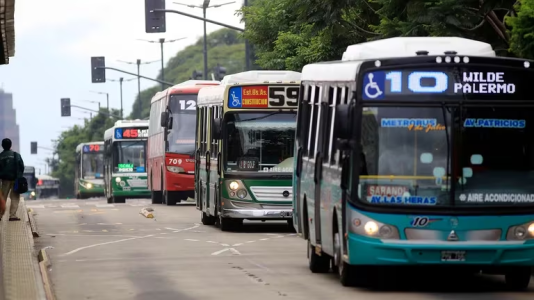
The "SUBE" is currently the only form of payment to urban buses in Buenos Aires (NA)
It is not something simple. Only in the Metropolitan Area of Buenos Aires (CABA and Greater Buenos Aires), the SUBE network has more than 340 bus lines. Furthermore, it is expected that there will be more than one company offering the services of providing card readers and subsequent processing of payments. According to the Government, these will be contracts between private parties , between transporters and financial companies.
Financial market sources assure that there is already progress in this area. Sbase, the Buenos Aires subway company, is close to closing an agreement with a group of technology providers to install a card reader in parallel to the SUBE readers in each Buenos Aires station in the coming months. And in the case of railway lines administered by the national State, it is expected that they will be forced to call a public tender to designate a supplier.
The SUBE will continue
The new scheme, it is worth reiterating, provides that in all cases the SUBE system will remain in force . All new payment methods will be added to the current system. And without the inconvenience of the user “putting the card in their name.”Regarding technology, the draft of the decree points to the use of contactless cards that allow payment by simply bringing them close to the reader, either the plastic or the cell phone that carries them, in the case of those who use wallets such as Google or ApplePay. The use of NFC technology is mentioned as the main alternative.
One of the doubts is whether QR payment can be used, which could be excluded due to the difficulty entailed by its “latency time”: that is, a delay of several seconds, a reasonable waiting time at the supermarket checkout but not to board a bus or cross a turnstile on the Buenos Aires subway network. An eventual exclusion of the QR could negatively affect Mercado Pago, the main driver of QR technology in the country.
And Nation Services?
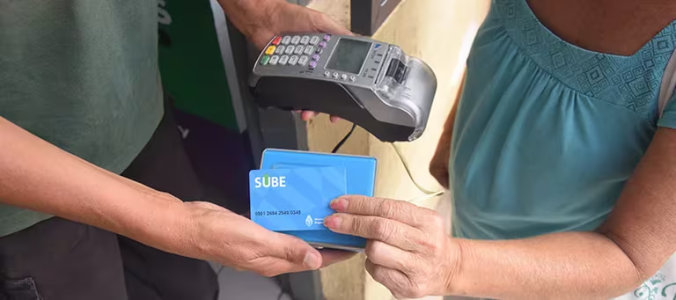
"SUBE is a monopolistic state company (Nación Servicios), with 1,050 employees, which charges a 7% commission on each train ticket," said deputy Arabia
What will be the future of Nación Servicios once it is opened to competition from private companies? In the market there are plenty of guesses. One of them is that it will be converted to provide other services outside the SUBE system in the financial sector. Another is that it enters into privatization plans or, at least, the arrival of a private shareholder. Despite the reluctance of Congress and the banking union, Daniel Tillard 's management at the head of Banco Nación aims to transform it into a public limited company, a previous step in the privatization direction.
A critical point explained by those who know the activity of Nación Servicios, which unlike Banco Nación is already a public limited company, is its oversized staff. According to official data, Nación Servicios has 1,026 employees who, during the management of Silvina Batakis at the head of the entity, also became part of the Banking Association. Shortly after assuming his position in 2022 after his brief stint at the Ministry of Economy, Batakis agreed with the union led by Sergio Palazzo to give the staff of Nación Servicios the status of bank workers and also incorporate 248 workers into the Bank's permanent staff. in charge of selling the cards, with the recognition of their age.

